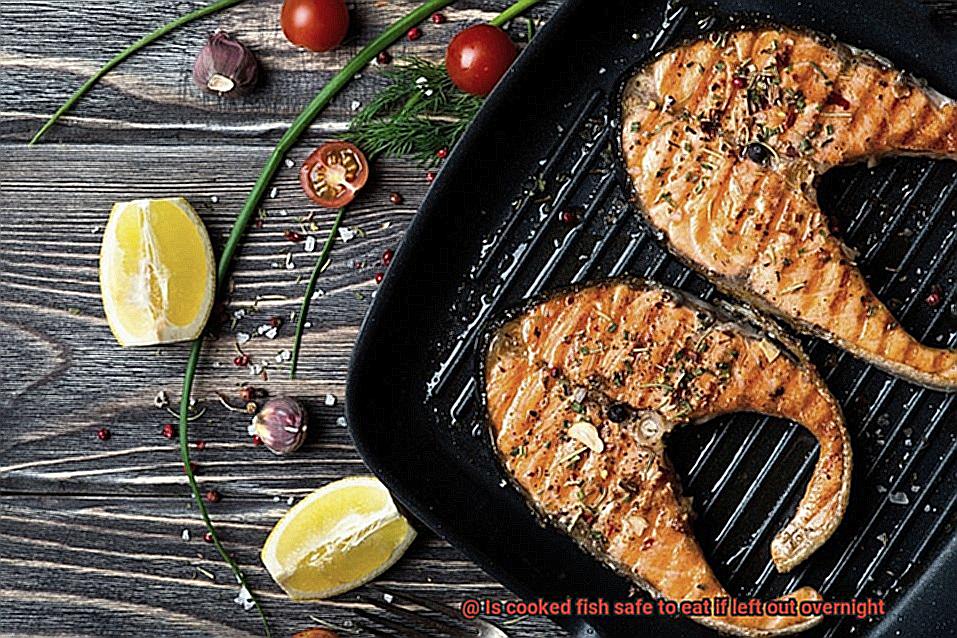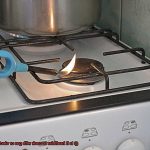Picture this: it’s the morning after a big dinner party or family gathering, and you’re staring at a plate of leftover cooked fish. You can’t help but wonder if it’s still safe to eat after being left out overnight. Sound familiar?
Well, here’s the deal – the answer isn’t as straightforward as a simple yes or no. There are several factors that come into play, such as the type of fish and how it was stored. And let’s be real, none of us want to risk getting sick from consuming contaminated food.
So, let’s dive into the nitty-gritty of food safety and preservation. Did you know that storing cooked fish at room temperature can create an ideal breeding ground for harmful bacteria? Yep, that’s right. Certain types of fish may be more susceptible to bacterial growth than others, so it’s important to know what you’re dealing with.
To fully understand the dangers of consuming cooked fish left out overnight, we’ll explore everything from the ideal temperature range for storing cooked fish to common types of bacteria found in seafood. Plus, we’ll provide some helpful tips on proper handling techniques to reduce the risk of contamination.
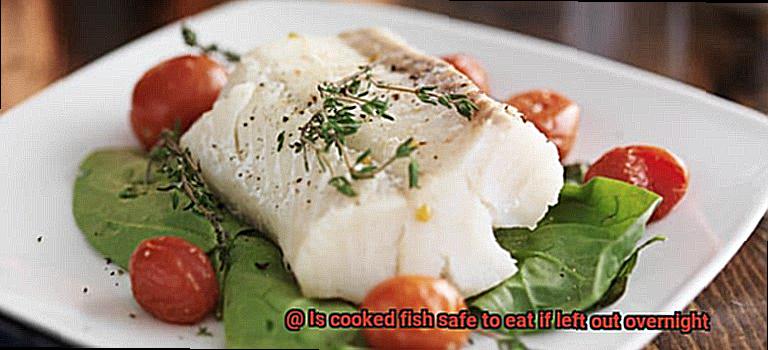
If you’re curious about whether or not your leftover cooked fish is safe to eat, then keep reading because we’ve got all the information you need to make an informed decision about your next meal.
Contents
The Basics of Food Safety: Storing Cooked Fish
If you’re a fan of cooked fish, then you know how important it is to store it safely. The last thing you want is to fall ill with a foodborne illness due to improper storage. As an expert in food safety, I’m here to share with you the basics of food safety when storing cooked fish.
First and foremost, it’s crucial to understand that cooked fish is a prime candidate for bacterial growth due to its protein and moisture content. When left out at room temperature for more than two hours, harmful bacteria can multiply rapidly, leading to potential health risks. To keep yourself and your loved ones safe, always store cooked fish in the refrigerator or freezer.
When storing cooked fish, ensure it’s in an airtight container or wrapped tightly in plastic wrap or aluminum foil. Label the container with the date it was cooked and use it within a few days. Keep in mind that oily fish like salmon or tuna are more susceptible to spoilage than leaner fish like cod or haddock due to their higher fat content.
When reheating cooked fish, ensure it reaches an internal temperature of 165°F (74°C) to kill any bacteria that may have grown during storage. There are various methods for reheating cooked fish such as baking it in the oven or microwaving it in a covered dish with a small amount of water.
To recap, here are some key takeaways for storing cooked fish safely:
- Always store cooked fish in the refrigerator or freezer within two hours of cooking.
- Use an airtight container or wrap tightly with plastic wrap or aluminum foil.
- Label the container with the date it was cooked and use within a few days.
- Reheat cooked fish thoroughly by ensuring it reaches an internal temperature of 165°F (74°C).
Bacterial Growth and Cooked Fish: Why Is It So Vulnerable?
Cooked fish is a tasty and nutritious meal, but it is also vulnerable to bacterial growth due to its high protein content and moisture levels.
Proteins are the building blocks of life, and fish is an excellent source of protein. However, when fish is cooked, its protein structure changes, making it easier for bacteria to access and consume. This means that cooked fish left out at room temperature becomes a feast for bacteria, leading to rapid multiplication and the production of harmful toxins that can cause food poisoning.
Moisture is another factor that contributes to bacterial growth in cooked fish. Fish contains a lot of water, and when it is left out at room temperature, moisture evaporates, creating a warm and moist environment that bacteria love. This environment provides an ideal breeding ground for bacteria to thrive and multiply.
The longer cooked fish sits at room temperature, the higher the risk of bacterial growth. According to the United States Department of Agriculture (USDA), cooked fish should not be left out at room temperature for more than two hours. After this time, the risk of bacterial growth increases significantly, making the fish unsafe to eat.
To keep your cooked fish safe, it’s crucial to store it properly as soon as possible after cooking it. Use an airtight container and label it with the date of cooking so that you know how long it has been stored for. When reheating your cooked fish, make sure it reaches an internal temperature of 165°F (74°C) to kill any harmful bacteria.
The Two Hour Rule: How Long Can You Leave Cooked Fish Out?
If so, it’s essential to understand the Two Hour Rule to avoid any unwanted food poisoning. As an expert in this field, I highly recommend following this rule to ensure that the fish stays safe for consumption.
The Two Hour Rule is a food safety guideline that warns against leaving cooked fish at room temperature for more than two hours. This rule is vital because bacteria thrive rapidly in moist and protein-rich environments like cooked fish, leading to food poisoning.
It’s crucial to note that the Two Hour Rule applies to both cooked and raw fish. Whether you have cooked or raw fish sitting out at room temperature for more than two hours, it’s better to discard it rather than taking any risks. Remember, your health is more important than a meal.
To avoid any chances of food poisoning from cooked fish, it’s always better to store it in an airtight container labeled with the date of cooking before putting it in the refrigerator or freezer as soon as possible after cooking. This way, you can prolong the freshness of the fish and prevent bacteria growth.
Moreover, if you plan on eating the fish later, make sure to reheat it to an internal temperature of at least 165°F (74°C) before consuming. This step helps eliminate any bacteria that may have grown while the fish was stored.
Refrigeration and Freezing: Proper Storage for Cooked Fish
If so, then you know how delicious and nutritious cooked fish can be. However, did you know that proper storage is crucial in maintaining the safety and quality of cooked fish? As an expert in food safety, let me walk you through why proper storage is essential and what you need to know to keep your cooked fish fresh and safe to eat.
Fish is a delicate protein that requires care to preserve its flavor, texture, and nutrients. Proper refrigeration and freezing are crucial in maintaining the quality and safety of cooked fish. Leaving cooked fish out at room temperature for more than two hours can lead to the growth of harmful bacteria, which can cause foodborne illness. This is why it’s important to know how to store your cooked fish properly.
The two-hour rule is a general guideline for refrigeration. Ideally, cooked fish should be stored in the refrigerator within two hours of cooking. However, if the room temperature is above 90°F, then the time limit drops down to just one hour. It’s important to note that the two-hour rule is not a guarantee of safety and should only be used as a guide. If the fish has been left out for longer than two hours, it’s best to discard it.
When storing cooked fish in the refrigerator, it should be placed in an airtight container or wrapped tightly in plastic wrap or aluminum foil. This prevents air from getting in and helps maintain the freshness of the fish. Labelling the container with the date of storage ensures that you keep track of how long it has been in the refrigerator and consume it before it goes bad. Cooked fish can generally be stored in the refrigerator for up to three days.
If you don’t plan on consuming the cooked fish within three days, then freezing it is your best bet. Before freezing, make sure the fish has cooled down completely and is wrapped tightly in freezer-safe packaging. Freezing cooked fish can help extend its shelf life for up to six months, but it’s recommended to consume it within four months for optimal quality.
Different Types of Fish and Spoilage Risk
Fish is a versatile and healthy source of protein that can be cooked in a variety of ways. However, when it comes to storing fish, it’s important to understand the different types of fish and their varying levels of spoilage risk when left out overnight. Here are five sub-sections that explain the different types of fish and their spoilage risks:
High Spoilage Risk Fish
Fish that are high in protein and moisture content, such as salmon and tuna, are more prone to spoilage if left out overnight. These types of fish provide an ideal environment for bacteria to grow quickly in warm temperatures. This makes it crucial to refrigerate them within two hours of cooking to prevent bacterial growth and avoid foodborne illness.
Low Spoilage Risk Fish
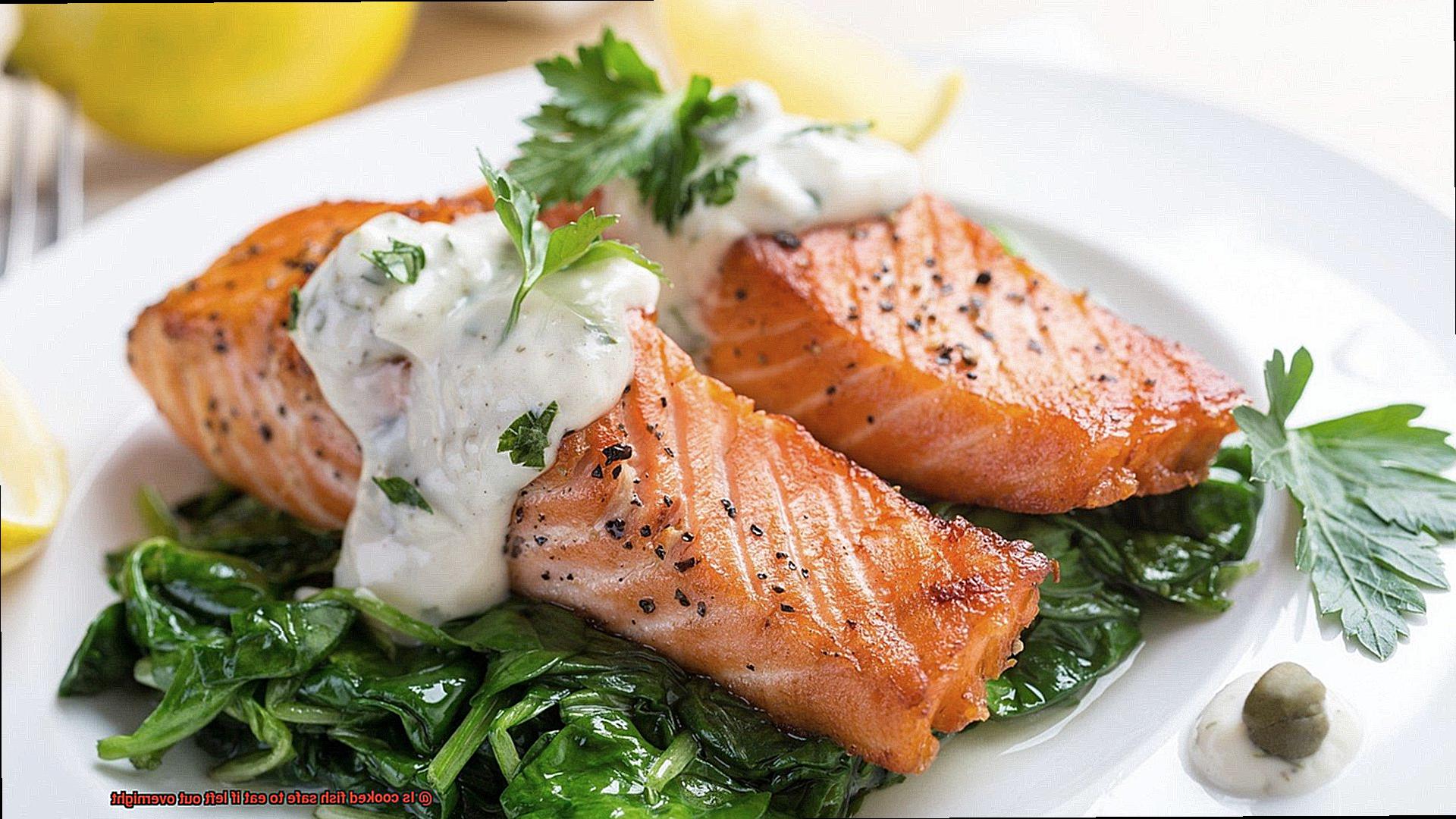
In contrast, fish that are firm in texture and have lower water content, such as cod and haddock, have a lower risk of spoilage when left out overnight. However, it’s still important to refrigerate cooked fish within two hours of cooking to be safe.
Shellfish Spoilage Risk
Shellfish, such as shrimp and lobster, also have a higher risk of spoilage due to their delicate nature and the fact that they are usually served cooked. Be sure to refrigerate any leftover cooked shellfish within two hours of cooking to avoid foodborne illness.
Risks with Cooked Fish Dishes
When it comes to dishes that include cooked fish, such as fish pie or fish curry, the risk of spoilage increases due to the addition of other ingredients that can also spoil if left out overnight. To minimize the risk of foodborne illness, separate any leftover cooked fish from the rest of the dish and refrigerate it separately.
Importance of Proper Storage
Properly storing cooked fish is key to avoiding foodborne illness. Refrigerate cooked fish within two hours of cooking to prevent bacterial growth. Remember that some types of fish are more susceptible to spoilage than others, so it’s always best to err on the side of caution when it comes to food safety.
Potential Illnesses from Eating Spoiled Cooked Fish
One of the biggest concerns with eating spoiled cooked fish is the potential for food poisoning. When cooked fish is left out at room temperature for too long, bacteria can begin to multiply rapidly, leading to the development of harmful toxins. These toxins can cause a range of symptoms, including vomiting, diarrhea, and stomach cramps. Trust me when I say that spending the night hugging your toilet bowl is not worth the convenience of not refrigerating your leftover fish.
But it’s not just food poisoning you need to worry about. Another potential issue with consuming spoiled cooked fish is histamine poisoning. This occurs when fish that has not been stored properly begins to develop high levels of histamine. Histamine is a compound that occurs naturally in fish and is typically broken down by enzymes in the body during digestion. However, when levels become too high, they can cause symptoms such as headaches, dizziness, and skin flushing.
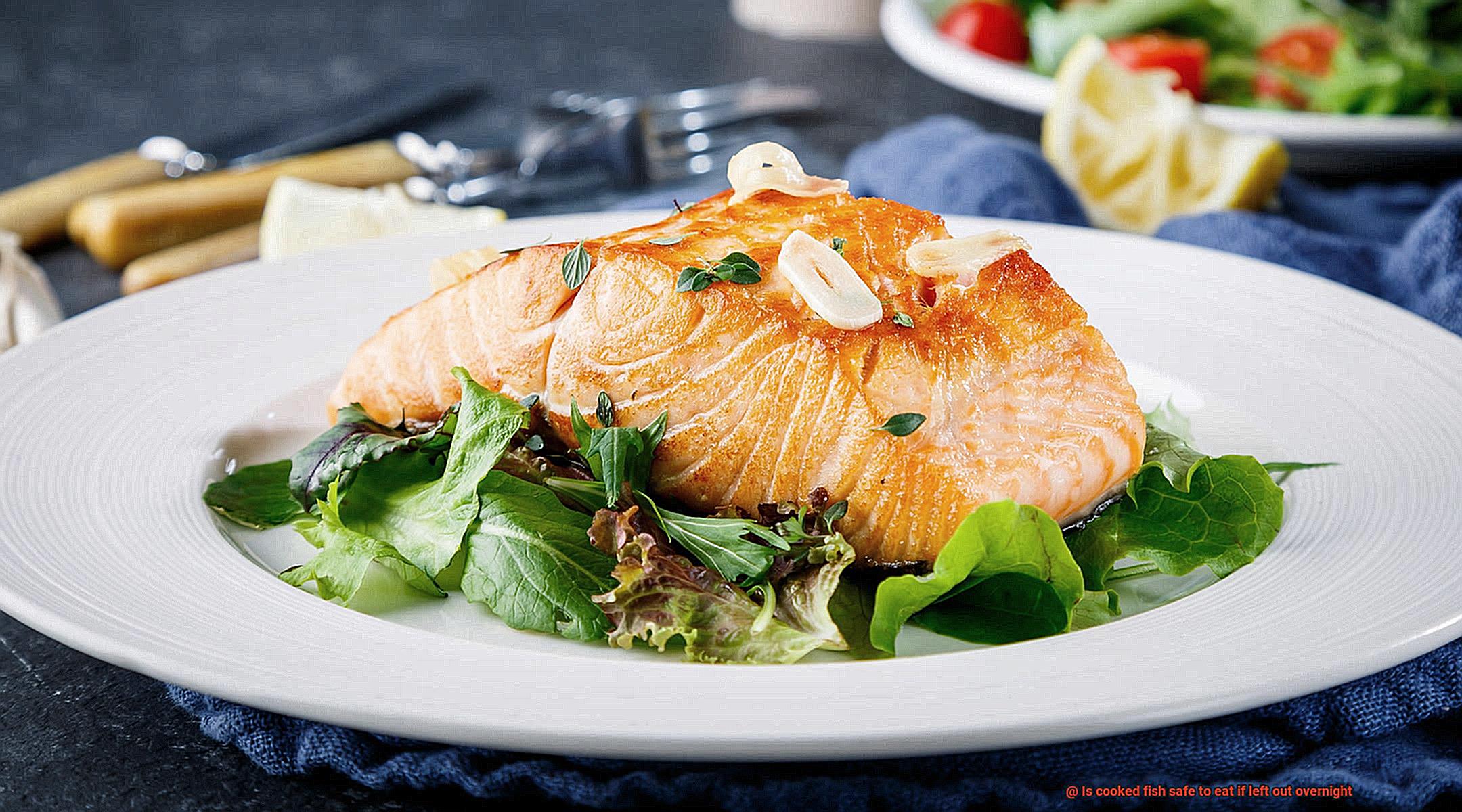
To minimize your risk of falling ill from eating spoiled cooked fish, there are several steps you can take. First and foremost, never leave cooked fish out at room temperature for more than two hours. If you’re not planning on eating your leftovers right away, refrigerate them promptly after serving. Additionally, it’s important to ensure that all fish is cooked thoroughly before consumption to kill any potential bacteria present.
It’s important to note that while the risk of food poisoning from spoiled cooked fish is real, it can be mitigated by following proper food safety protocols. By taking these steps, you can greatly reduce your risk of falling ill from eating spoiled fish.
Best Practices for Handling Cooked Fish Safely
Cooked fish is a mouthwatering and nutritious meal that can be prepared in a variety of ways, but it is essential to handle it safely to prevent foodborne illnesses. As an expert in food safety, I am here to provide you with the best practices for handling cooked fish safely.
Proper storage of cooked fish is the first step towards ensuring its safety. If you are not planning on consuming it right away, store it in an airtight container in the refrigerator within two hours of cooking. This will prevent the growth of harmful bacteria that can cause food poisoning.
Reheating cooked fish is also crucial, and it should be done properly to avoid any risks. Use an oven or microwave to bring the fish back up to a safe temperature of 165°F (74°C), and use a food thermometer to check the internal temperature before consuming.
Cross-contamination is another factor to consider when handling cooked fish safely. Keep your cooked fish separate from raw fish and other raw meats during preparation and storage. Furthermore, use separate cutting boards, utensils, and dishes for cooked and raw fish to prevent any spread of bacteria.
Lastly, be mindful of the expiration date on your cooked fish. Generally, cooked fish can be stored in the refrigerator for up to three days before it should be consumed or discarded. If you are uncertain about its freshness or safety, it is better to discard it than risk getting sick.
To sum up, here are the best practices for handling cooked fish safely:
- Store cooked fish in an airtight container in the refrigerator within two hours of cooking.
- Reheat cooked fish properly using an oven or microwave and check its internal temperature using a food thermometer.
- Keep cooked fish separate from raw fish and other raw meats during preparation and storage.
- Use separate cutting boards, utensils, and dishes for cooked and raw fish.
- Pay attention to the expiration date on your cooked fish and discard it if unsure about its freshness or safety.

Tips for Keeping Your Kitchen Clean and Safe
Maintaining a clean and safe kitchen is crucial to prevent the spread of harmful bacteria and ensure that your food is safe for consumption. Here are five sub-sections explaining the importance of washing hands, cleaning surfaces, and storing cooked food properly:
Wash Your Hands Thoroughly
Washing your hands is one of the most important things you can do to keep your kitchen clean and safe. Bacteria can easily transfer from your hands to the food you’re preparing, so it’s crucial to wash your hands regularly. Make sure to use warm water and soap for at least 20 seconds, especially after handling raw meat, poultry, or fish.
Clean Surfaces Regularly
All surfaces in your kitchen that come into contact with food must be kept clean and sanitized. This includes countertops, cutting boards, utensils, and any other surfaces that food touches. Use hot, soapy water to clean these surfaces, and then sanitize them with a solution of one tablespoon of bleach per gallon of water. Regular cleaning can help prevent the growth of harmful bacteria.
Properly Store Cooked Food
Storing cooked food properly is critical to keeping it safe to eat. Cooked fish (and any other cooked food) should be refrigerated within two hours of cooking it. Make sure to store it in an airtight container to prevent contamination from other foods in the fridge.
Use Separate Cutting Boards
To avoid cross-contamination, it’s essential to use separate cutting boards for raw meat, poultry, and fish. This will prevent any harmful bacteria from spreading to other foods. After each use, wash cutting boards thoroughly with hot soapy water to remove any bacteria.
Check Expiration Dates
Checking expiration dates on all food products before using them can help prevent the spread of harmful bacteria. Expired or spoiled items can contain bacteria that can cause foodborne illnesses, so it’s essential to discard them immediately.
Mqe_TxKsPmM” >
Conclusion
In summary, the answer to whether cooked fish left out overnight is safe to eat is not a simple one. It depends on various factors such as the type of fish and how it was stored. However, what’s clear is that food safety should always be a top priority to avoid any potential health risks.
To ensure your cooked fish remains safe for consumption, make sure to store it in an airtight container or wrap it tightly with plastic wrap or aluminum foil and refrigerate it within two hours of cooking. Keep in mind that oily fish like salmon or tuna are more prone to spoilage than leaner options such as cod or haddock due to their higher fat content.
It’s crucial to reheat cooked fish thoroughly by ensuring it reaches an internal temperature of 165°F (74°C) before consuming. Additionally, the Two Hour Rule should be followed at all times – never leave cooked fish at room temperature for more than two hours as this increases the risk of bacterial growth.
By adopting best practices when handling and storing cooked fish and maintaining a clean kitchen environment, you can significantly reduce your chances of getting sick from eating spoiled food.

